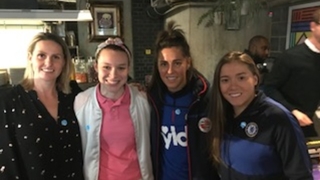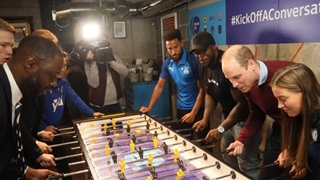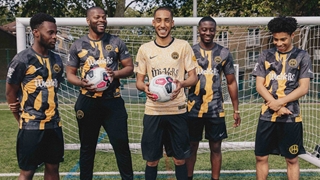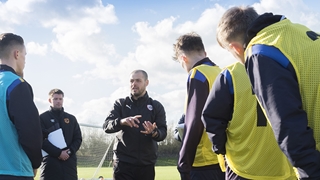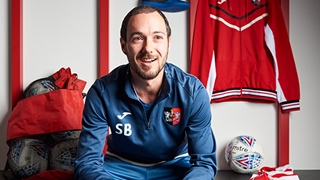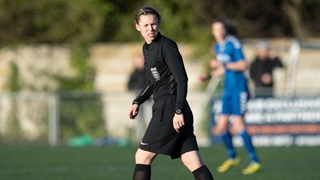
People often feel isolated and even ashamed of speaking out.
Thankfully, perceptions of mental health are changing and Time to Talk Day is an opportunity to encourage everyone to be more open when it comes to mental health, whether that’s through talking or listening to help change lives.
To mark Time to Talk Day 2020, we're launching a toolkit aimed specifically at the 28,000 qualified referees across all levels of the game in England.
Officials are an integral part of the game we all love and it is important to support them through their journey and ensure they can spot any signs of mental health problems in themselves and others around them.
Here's the story of one grassroots referee, who used football as a tool against her depression...
"I’ve loved football since I was about eight, when I started going training with my brother before getting into refereeing much later.
"I initially dealt with a lot of people judging me because I was a girl, but as soon as they saw me play everyone wanted me on their team.
"Soon I was playing for Blackpool Girls, after finally seeing a girls’ team set up at the club my brother played for and doing really well in our first season.
"But I was finding high school quite hard, closing myself off from friends as I just didn’t really want to socialise and threw myself into work. I now look back and realise this was properly the start of my undiagnosed depression, and football and work was my release.
"I pushed myself too hard and I got a bad virus which meant I couldn’t play football for over six months so I become very withdrawn and went further into overload of work.
"At this time, I felt really confused but mental health was something I knew little about and no adult ever even asked me about how I was.
"From high school I went to college to do sports, where I was so happy playing football every day, making new mates and getting back the balance in my life. I did really well in my first year, won student of the year in sport and player of the season in the girls’ football team after scoring 30-odd goals before I got selected to go on a three-week trip abroad with other students to do coaching.
"But I found my second year of college hard and started to feel more isolated again, which made me quite insecure and I was skipping classes, just reading books in the corridors. I began to spend a lot of time in my room with headphones on, having very little conversation with anyone.
"After a few months I just felt like I couldn’t take any more of feeling the way I did so I took two or three packets of pills I found in the cupboard. I passed out and got taken to hospital, before getting out on more tablets and having regular meetings with a mental health team.
"But, if I’m honest, the services were not what they are now as nothing was ever explained to me properly. I felt ashamed to be on pills and didn’t feel like the people having meetings understood me.
"It was only a few months after finishing college and doing a few different jobs, before I started as a teaching assistant and it was around this time I started a course for refereeing which I really loved.
"I started to progress really quickly through the ranks and was doing well in my coaching too, gaining my Level Two.
"Unfortunately, I soon started struggling again. I went to the doctors and for whatever reason, I was taken off the anti-depressants pretty rapidly without slowing coming off them. My memory of this time is very hazy, I only remember some details, but basically I was so depressed I got to a point where I rang a mate and just said I can’t do this anymore.
"At this point, I was ten metres from the side of a main road crying with my friend talking to me and saying it will get better. My eyes closed, I fell to the ground and the next thing, I was in an ambulance.
"I was put back on medication and had a number I could ring or text whatever time of day, but I was still struggling and after a few weeks I made another attempt on my own life when I was transferred to a mental health hospital.
"I was there for what felt like a lifetime but I gradually got better and after lots of visits from my family and friends, I went back home finally feeling like a human again and wanting to restart my life. I went back to doing some coaching and started to make plans for my refereeing comeback .
"During my recovery, refereeing became a big aim of mine. I loved the feeling I got when I did it and wanted to get better physically and mentally so I could start again.
"The FA really supported me and told me to take my time and not to rush. I also had the support of my coach and Anthony Taylor, my FA regional core leader was keeping in contact with me after visiting me in hospital.
"After a few months, I was back out on to the pitch refereeing and enjoying every moment and slowly my life got back on track.
"I believe everything happens for a reason and I felt like depression happened to me for a second time because I never really came to terms with it initially. I was ashamed of taking tablets and the whole stigma of being weak because I had a mental illness of depression.
"I think as a service, mental health understanding has developed a great deal between 2014 and 2017. The people looking after me and my welfare seemed more knowledgeable and understanding of mental illness.
"It’s all made me more determined to speak about my experiences and help others and since then, if I have thought anyone in the street looks like they need a chat I have always asked them if they’re ok.
"I’ve become more educated about mental illnesses to understand how I can help people with anxiety and other illnesses too. I think one of the main things I took away was that although it’s not a visible injury, mental illness is often worse as people can’t see it and it not a quick healer.
"I’d like to think because of everything I’ve been through, I’ve become more understanding about other people and I definitely think I’ve become a stronger person having gone through all this. I’m happy to say I’ve being doing really well since and want to help as many other people as possible in the future .
"I think this campaign has the potential to be the most powerful campaign for better mental health for everyone, as football is Britain’s most loved, played and watched sport."
Download the mental health guidance notes for referees

